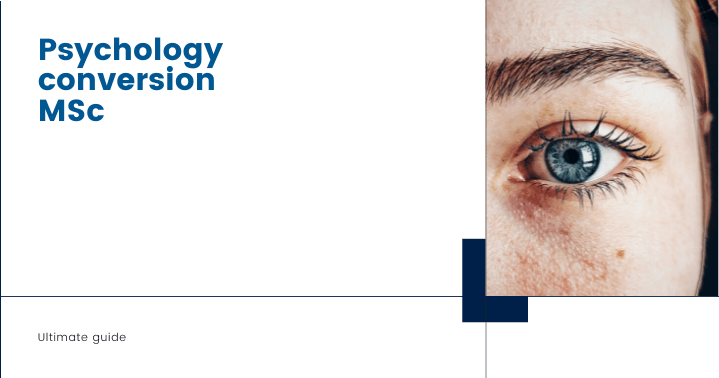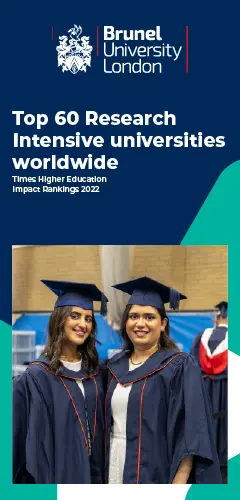To become a clinical, chartered psychologist in the UK requires a BPS-accredited undergraduate degree in psychology followed by Health and Care Professions Council (HCPC) certified training that combines postgraduate study and clinical work experience. This article has more information on the importance of BPS accreditation.
A Psychology conversion course is a Master’s degree designed for students with unrelated or unaccredited undergraduate degrees who want to develop a career in clinical psychology.
A Psychology conversion course is a Master’s degree designed for students who have an unrelated or unaccredited undergraduate degree and want to develop a career in psychology. The British Psychological Society (BPS) accredits these courses.
You can use this link to compare online psychology courses from UK universities.

Who is this type of course for?
At a minimum, applicants need to:
- Have an undergraduate degree in an unrelated subject or an unaccredited psychology degree.
- Have decided on a career in psychology and understand the steps required to gain chartered membership of the BPS.
These courses are for graduates who realise their passion for psychology after completing a degree in an unrelated field. Many students studying these courses already have some years of work experience. They are either looking for a career change or progress in their current roles.
These psychology conversion MSc’s are full Master’s degrees. Consequently, they are demanding and challenging courses. As such, prospective students typically have a clear career goal in mind and have already taken introductory courses or have experience of the role of psychology in a work environment.
For part-time and online conversion courses, most students are balancing study with existing work and family commitments.
The British Psychological Society (BPS)
The BPS is an independent charity that promotes excellence and ethical practice in psychology’s application, education, and science. They set standards and guidelines for the profession within the UK.
BPS accreditation and why it is important
Gaining the Graduate Basis for Chartered Membership of the BPS is the first step required to enter a career in psychology.
To be considered for a place on any training course in Clinical Psychology in the UK, you need to be eligible for Graduate Basis for Chartered Membership (GBC) of the BPS.
To understand the importance of the BPS accreditation, look at some of the jobs listed on the jobsinpsychology.co.uk (opens the link in a new window). You will see that all roles require BPS accreditation or eligibility for the Graduate Basis chartered membership as a minimum.
What do conversion courses cover?
For a Psychology Conversion MSc to gain the BPS accreditation, the course and teaching need to demonstrate a depth of learning and understanding in the following core areas of psychology.
- Biological psychology
- Cognitive psychology
- Developmental psychology
- Individual differences
- Social psychology
- Conceptual and historical issues in psychology
- Research methods
- Empirical Project
Most courses will have similar components. All courses will have an independent research project, which is required for the BPS accreditation. For this piece of work, you will undertake empirical research and question it using quantitative and qualitative methods and demonstrate a critical understanding of a range of psychological theories.
The requirements and process for a course to become accredited are comprehensive and cover general skills and quality of learning and materials. This link will take you to the guidelines for a course to gain accredited status.
Once you have a shortlist of potential courses, it is helpful to request a copy of the programme specification. This is quite a dry document, but it will show all the course’s learning outcomes.
What skills do Psychologists need to have?
The skills needed to succeed on a conversion course and become a competent practitioner are varied and demanding. These courses aim to give a solid foundation and exposure to the soft and hard skills required for a career in the profession.
Hard skills required in psychology are areas and processes that can be measured, tracked and demonstrated.
- Psychological & Cognitive Science Fundamentals
- Numeracy & Quantitative Research
- Clinical Reasoning
- Experiment Design
- Experiential Learning
The soft skills required in psychology are
- Communication
- Patience & Active Listening
- Critical Thinking
- Cultural Competence & Self-Awareness
- Compassion
- Ability to remain calm in stressful situations
- Strong observation skills
- Understanding of ethics
How long is a psychology conversion course?
Most psychology conversion courses last one year full-time and consist of 180 credits. Online and part-time courses can last from one to five years, depending on the flexibility offered. However, it is common to complete an MSc in two to three years whilst working full time. We have a guide to Master’s qualification that covers timing and credits in more detail.
What is a typical background of an MSC Psychology student?
The courses are a fast track to gaining professional accreditation for people looking to make a career change. There is no typical type of person who takes a psychology conversion course. Students joining these courses come from all walks of life with a wide range of ages and levels of work experience.
What are the career prospects?
Gaining Graduate Basis for Chartered membership from the BPS opens up a wide range of career prospects in the field of psychology as well as a stepping stone to becoming a chartered psychologist.
The main roles are psychologist, social worker and counsellor. However, nearly all sectors of society have need for psychologists. The leading employers are in the private sector, either in-house at large organisations or in smaller consultancies offering services to smaller organisations.
In the UK, two of the largest employers of psychologists are the civil service and the NHS. To get an idea of the roles open to graduates on conversion courses, put psychology in the job role section of the sites below (Opens in a new window).
Civil Service- Occupational psychology
The salary range for graduates?
Once you gain Graduate Basis, the job market for psychology graduates is competitive for specific jobs, but there is a wide range of areas to practice. The salaries below are taken from the National careers service website.
Forensic psychology salary

Sport and exercise psychologist salary

Clinical psychologist

Psychologist

How much does an MSc psychology conversion course cost?
The cost of Master’s degrees varies between universities. A Psychology conversion MSc is eligible for the government student loan. The maximum amount available is £11,570, and you will find most course fees under that amount. If you are self-funding, you should budget for approximately £10,000.
Most online Masters degrees offer flexible payment options. You can spread the costs out over the length of the course, which can make budgeting for your study much more manageable. We have a complete guide on funding your study here that you might find helpful.
International students would typically pay international tuition fees for on-campus courses, which can be significantly higher. However, international students pay the same tuition fees as home students for almost all online postgraduate degrees.
Next steps
We have a wide range of Psychology courses from UK universities you can search and compare.
If you already know the course you want to study our guides on university funding and time management are helpful resources.
If you have any questions about Psychology MSc’s, or any other area of online learning, get in contact via the contact page and we’ll be more than happy to help.
